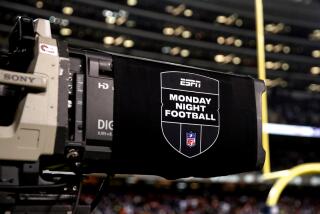Comcast-Time Warner Cable merger may hinge on Internet service expansion
Comcast Corp.’s bid to win state approval to purchase Time Warner Cable could hinge on whether the company becomes a generous corporate citizen.
California officials — who are considering whether to approve the merger of the nation’s two largest cable companies — have been prodding Comcast to use its vast resources to help expand Internet access and provide phone service for disabled residents.
As conditions to move the deal forward, state officials have tentatively asked the Philadelphia company to roll out faster Internet speeds for its customers and provide phone service and affordable Internet plans for low-income families. The state also wants Comcast to upgrade Internet connections for schools and libraries.
“This community needs access to the Internet,” Maria Elena Meraz, executive director of the nonprofit Parent Institute for Quality Education, told members of the California Public Utilities Commission this week at a packed hearing in downtown Los Angeles.
Meraz was one of nearly 140 speakers who turned out for the PUC hearing that stretched more than five hours. Dozens of speakers blasted Comcast, decrying the company’s reputation for lousy customer service. Others said they feared allowing one company to have so much power. If the $45-billion merger is approved, Comcast would provide service to nearly 30 million customer homes nationwide — including 4 million in California.
But some, including Meraz, saw the merger as an opportunity for Comcast to help introduce the Internet to immigrants and other low-income families.
“I was not advocating for Comcast,” Meraz said in an interview after the hearing. “I was advocating for low-cost Internet. Los Angeles has a huge low-income population, and if people are not exposed to technology, they are going to get left behind.”
This week’s hearing was one of at least three that PUC commissioners intend to hold to consider the deal. Comcast suffered a setback last week when PUC Commissioner Mike Florio said he wouldn’t support a deal that would threaten competition and slow investment in high-speed Internet lines throughout the state.
If the merger is approved, Comcast’s broadband Internet service area would cover 84% of the state’s population — up from about 35%. Comcast currently serves San Francisco, Sacramento and other regions in Northern California.
The PUC is scheduled to vote on the merger in late May or June. The deal also needs approval from federal regulators, who have spent more than seven months probing potential antitrust concerns.
It’s been 24 years since the PUC blocked a major merger. In 1991, the panel denied a controversial union of two large power companies, Southern California Edison Co. and San Diego Gas & Electric Co. Regulators at that time said the plan would not benefit consumers or keep a lid on rising utility rates.
The PUC must approve the transfer of California phone licenses to Comcast from Time Warner Cable and Charter Communications. Phone service is one of three key offerings that the companies provide. Because the companies bundle their phone, cable television and high-speed Internet services together, the PUC is weighing the overall effect of the merger on consumers.
Charter Communications is involved because it struck a side agreement with Comcast to swap customers. If Comcast wins state and federal approval to buy Time Warner Cable, it also will take over Charter’s cable systems that serve nearly 300,000 homes in Burbank, Long Beach, La Cañada Flintridge and other areas.
Comcast would become the largest Internet service and pay-TV provider in Southern California, with nearly 2 million customers.
Comcast — which has assembled armies of lobbyists — may have miscalculated in its dealing with state regulators, several observers said. Two months ago, an administrative law judge who is overseeing the case on behalf of the PUC issued a draft order that recommended approving the deal — with more than two dozen conditions.
But instead of agreeing to the proposed terms, Comcast issued a hard-nosed attack by saying the state lacked the authority to demand many of the conditions it was seeking. Comcast softened its stance this week.
On Tuesday the company submitted a list of voluntary commitments that it said would be acceptable. Comcast pledged to provide phone service for poor and disabled residents throughout its service area, provide billing statements in Braille or large print. The company also dropped its previous objections to a request to offer a free phone battery to disabled and low-income customers.
Comcast offered to spend $25 million to extend Internet lines to communities that lack service.
The cable giant also said it would offer its $9.95-a-month “Internet Essentials” program to eligible low-income students and families for at least five years after the merger closes. However, Comcast has not dropped its objections to aggressive mandatory penetration benchmarks to expand Internet access into poor neighborhoods.
The cable giant has long said it would expand its Internet Essentials program to low-income residents as part of the deal. However, the company wants the goals for the program’s expansion to be voluntary.
“We appreciate the level of interest people have in this important decision,” Comcast spokesman Bryan Byrd said. “We heard a resounding call for Internet Essentials in Southern California and are ready to bring this successful program to region’s students in time for the 2015-2016 school year.”
More to Read
From the Oscars to the Emmys.
Get the Envelope newsletter for exclusive awards season coverage, behind-the-scenes stories from the Envelope podcast and columnist Glenn Whipp’s must-read analysis.
You may occasionally receive promotional content from the Los Angeles Times.







